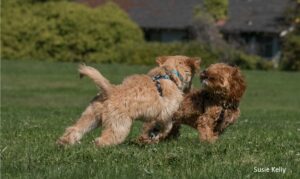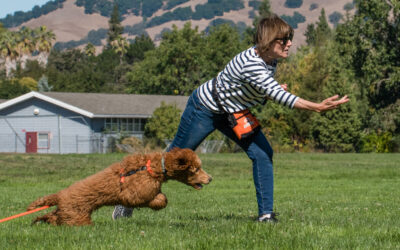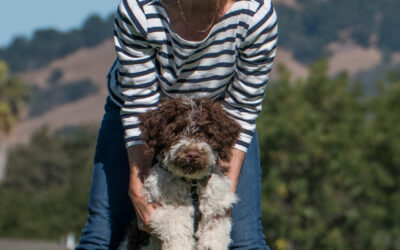 In the old days when I was growing up socializing puppies wasn’t something anyone planned. People turned their puppies and dogs out together and hoped for the best. The larger, more affable puppies tended to have an easy time and we chalked that up to their personality. But the more sensitive, perhaps anxious puppies had a hard time in the rough and tumble world of unsupervised play. Nevertheless, people allowed their puppies to be instructed and, “broken in,” by other dogs. If they didn’t understand or didn’t comply with another dog’s need to discipline or be, “top dog,” they were in for it.
In the old days when I was growing up socializing puppies wasn’t something anyone planned. People turned their puppies and dogs out together and hoped for the best. The larger, more affable puppies tended to have an easy time and we chalked that up to their personality. But the more sensitive, perhaps anxious puppies had a hard time in the rough and tumble world of unsupervised play. Nevertheless, people allowed their puppies to be instructed and, “broken in,” by other dogs. If they didn’t understand or didn’t comply with another dog’s need to discipline or be, “top dog,” they were in for it.
Bully or Teacher?
This was when things got a bit rough because if a dog wanted to bully a puppy no one would stop him or intercede on the puppy’s behalf. The results could be hard to watch for the more sensitive among us, certainly for the sensitive recipients of that dog’s bullying. They called these lessons, “letting dogs work it out.” I was never clear what they were working out, as it seems the overbearing or bullying dog had little to teach that puppy, except to stay out of his way.
We understand so much more about bullying nowadays, yet some people continue to allow this behavior to be directed at puppies.
From Roughhousing to Bullying
We understand so much more about bullying nowadays and how it impacts recipients. Sadly, some people continue to allow this behavior to be directed at puppies. What we now know about bullying behavior in children is that it has long term consequences for a child’s self-esteem and confidence, as well his ability to work out problems in a constructive way. What I have seen in many years of raising and training puppies is that bullying behavior results in long-term trauma and reactivity in maturing puppies. For dogs that are allowed to bully, challenge, and play rough with other dogs, it results in an inflated sense of power that can easily lead to aggression.
Imagine your 4-year old child in a schoolyard with several other children and one of them is jostled and accidentally trips and falls to the ground. Before long all are in tears and none know quite what to do, which makes them more upset. You are at the other end of the playground and another adult is walking over rapidly to take control of the situation. If you are like most parents you’re on your feet immediately and moving quickly to the scene. Why? Whether you know this other adult or not, you are going to be the one to help your child deal with the situation. You want to ensure she develops good social behavior, confidence, and learns how to express herself and get her needs met. You are also there in to protect her, because you have her back. This is the socialization process for children, and it is the same with puppies.
Personally, I would no sooner allow a strange dog to teach or discipline my puppy than I would allow a stranger to work things out with a child. These life lessons and experiences are too important, too pivotal. Not to blame anyone; but chances are that adult or dog may not have your priorities, concerns, or goals at heart in that moment. To be fair, it’s not his job. On the other hand.
What if your puppy is being rude?
I always caution people not to allow their puppy unfettered access to an adult dog they don’t know or have control of. This is because young puppies have no social skills or impulse control. They frequently get overexcited during introductions and jump in the other dog’s face. This of course, is not good, “dog speak,” or etiquette and many older dogs dislike it. The problem arises when young puppies miss the subtle social cues adult dogs give to indicate they are not interested in furthering the conversation. Let’s face it, puppies have sharp teeth and nails and they don’t take, “No,” for an answer when they are overstimulated. It’s downhill from there, especially if that older dog is trapped on a leash and has no exit strategy. At this point he may well take it upon himself to discipline your puppy for being so rude. Sadly, in most puppy’s eyes they’ve done nothing wrong except try to be friendly. What ensues can range from unpleasant to frightening, and possibly result in injury to your puppy. Encounters like this are memorable, especially for more sensitive puppies who may decide strange dogs, dogs of a certain breed or profile are to be avoided at all costs. They also learn no one protected them, an unfortunate assumption for a puppy in a new home. So much for, “working it out.”
What to do Instead?
The best introductions for young puppies are done in a controlled environment. Ideally they are learning opportunities for puppies where you can teach them how to greet an older dog, what to do instead of jump or bark.
To learn how to manage your puppy’s introductions to other puppies or dogs, bring your puppy for a Visit to the Nursery. It’s an ideal way to watch as I introduce your puppy to some others.



